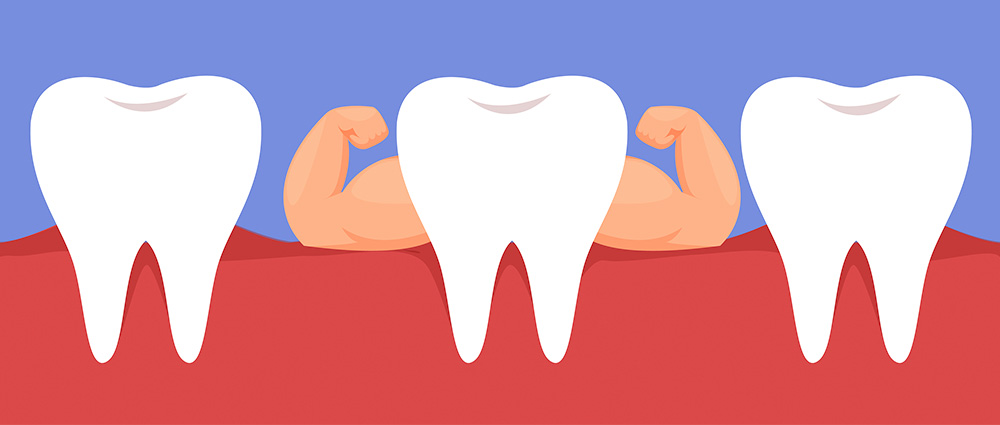Can damaged tooth enamel be repaired?

Are you suddenly suffering from sensitivity to hot or cold foods and drinks? Are your teeth becoming discoloured? Have you suffered a crack in your tooth?
Maybe your enamel is becoming worn down, or even worse, destroyed?
Well we have some good and bad news. The good news is that worn-down enamel can be repaired through a few methods; the bad news is that destroyed enamel cannot be restored.
Read on to find out great tips to take care and repair enamel,
What is enamel?
Enamel is the thin outermost clear protective layer covering the teeth. It’s the hardest tissue in the entire body.
The role is to protect the teeth from damage caused by chewing, biting, crunching and grinding. It’s also pretty good at shielding your teeth from painful temperatures and bacteria.
What is tooth enamel erosion?
Enamel erosion happens when the enamel is becoming worn, chipping and cracking. This is caused by a lack of dental care, tooth grinding and the foods and drinks you consume.
It’s easy to identify as it causes your teeth to start becoming discoloured, sensitive to hot or cold foods and an increase in chips and breaks. If these are signs you notice, it’s best to visit a dentist to find out if your enamel is becoming worn down.
What causes enamel erosion?
There are many causes for enamel loss, including the following:
- Sugary and acidic drinks – Soft drinks, fruit drinks, cordials, and certain alcohols etc.
- Diet – High sugar and starch intake
- Dry mouth – Saliva flow helps enamel
- Acid reflux
- Certain medications – antihistamines, and aspirin etc.
- Genetics – Inherited conditions
- Gastrointestinal problems
- Acids caused by bacteria in plaque
- Environmental factors
Environmental factors include natural tooth-to-tooth friction, biting, chewing, brushing, stress fractures and corrosion.
Preventing enamel loss
Restrict sugar and acid intake – You should restrict the intake of these foods and drinks from your diet, such as candies, carbonated sodas, citrus fruits and juices. If you do have these products, it’s best to rinse your mouth with water.
Why not swap out fruit drinks for fresh fruit?
Use a straw – Did you also know that drinking through a straw helps push liquid to the back of your mouth, skipping past your teeth? This is great for consuming acidic or sugary drinks.
Watch your snacks – Monitor how many snacks you are having throughout the day, so you know when enough is enough. It’s also best to rinse your mouth after snacking.
Healthy, well balanced diet – Making sure you consume enough of the correct foods to ensure you receive enough vitamins and minerals is important and helps promote a healthy body.
Seek medical treatment for reflux – If you suffer reflux on a regular basis, it may be advised to visit a gastroenterologist or even your GP for help, as reflux can cause extreme damage to enamel.
Sugar-free gum – Chewing gum which contains no sugar is great for promoting saliva flow. Saliva hydrates your mouth, prevents cavities, washes debris and excess acids away, and contains antimicrobial agents that help tackle bad bacteria.
Fluoride toothpaste – Using a fluoride toothpaste helps protect enamel, as fluoride strengthens teeth and makes them more resilient against acid attacks.
Soft-bristled toothbrush – Did you know that those cheap hard bristled toothbrushes will scratch and damage your enamel? So it’s best to choose a soft-bristled toothbrush instead.
Drink water – Water is important for everyone’s bodies, and it also keeps your mouth hydrated.
If you happen to consume or come into exposure to strong acids, you can use a fluoride mouth rinse and use dairy products to help counter the acids.
Can you repair tooth enamel loss?
Weakened enamel:
Enamel repair depends on the problem and severity. Very minimal to mild enamel erosion can be strengthened through good oral hygiene, fluoride treatments, fluoride toothpastes, vitamin and calcium intake, cutting sugar out and a range of other methods that the dentist can suggest.
Severely damaged or destroyed enamel
A common question asked is, ‘does tooth enamel regrow?’.
The simple answer is no! If your enamel is gone, it cannot come back, however damaged enamel can strengthen through the number of approaches already listed.
For worse cases, or destroyed enamel, treatments can be suggested to offer protection.
Porcelain veneers or crowns may be required. Veneers are used to protect and restore only the front of the tooth, whereas crowns are used to entirely cover and restore a tooth.
If you think you suffer from enamel loss, or have an issue such as sensitive teeth, it’s best to contact the dentist. The friendly team at Wahroonga Dental is happy to answer all questions and concerns regarding dental health. So, if you have any questions or would like to book an appointment, please contact us here.
